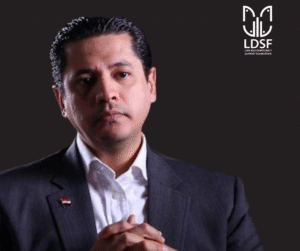
Tackling Transnational Repression in Germany
A Policy Paper by the Coalition Against Transnational Repression in Germany, April 2025
Transnational repression (TNR) is an old phenomenon but currently resurfaces globally to an alarming extent. Authoritarian state and state-affiliated actors target individuals beyond their own national borders on foreign state territory employing a wide tool set to surveil, intimidate and harm them, thus violating their fundamental rights guaranteed under international law as well as domestic laws. Human rights defenders, journalists, academics, lawyers, members of persecuted ethnic groups and members of the opposition are particularly affected. Some threats may be punishable under German criminal law, while in many cases attacks are purposefully conducted below the threshold of criminal liability. It is often obvious that they originate from state actors, but almost as often difficult to prove in court. Important contact points, such as law enforcement agencies, lack training, expertise and experience with TNR.
There is a pressing need to address TNR in Germany, as responses by German authorities have been insufficient and largely inaccessible to targeted communities and individuals. Yet, the complexity of TNR issues and lack of legally binding definitions, both in international and domestic law, has made the phenomenon, and its effects, challenging to track and measure.
The Coalition against Transnational Repression in Germany defines TNR as:
“a strategy employed by foreign governments reaching across borders to intimidate, silence, or harm members of diaspora and exile communities in order to prevent them from exercising their human rights as defined in the German Basic Law.”
TNR exerts a detrimental influence across all levels of society, encompassing individual rights, national security and democratic institutions. Therefore, responses must be equally multi-layered and comprehensive.
This paper examines, first, the threats that TNR poses in Germany, including common tactics, key countries and targets of TNR. Second, it provides an overview of the status quo of protection against TNR in Germany. Third, the paper will propose the establishment of a National Coordination Office on Transnational Repression that will be able to handle the complex tasks to prevent TNR and support those who are targeted nevertheless, as outlined at the end.
About the Coalition against Transnational Repression in Germany
The Coalition against Transnational Repression in Germany was founded in August 2024 and currently consists of 14 German human rights and diaspora organizations that aim to raise awareness about the threat ofTNR and its impact on human rights, freedom and security in Germany. The coalition is committed to promoting a better understanding of the phenomenon, protection and support for those affected and to raising awareness among society, politics, security authorities and administration. To promote these goals, the coalition provides a space for affected people and civil society organizations to exchange ideas, carries out public relations and networking work and engages in joint advocacy work.
Background to tackling TNR in Germany
TNR is affecting the exercise of basic human rights for a diverse range of targets in Germany. The tactics are rapidly evolving, driven by the advance of digital technologies, particularly surveillance capabilities, and growing authoritarian tendencies worldwide as well as transnational impunity of perpetrators. Eventually they have coercive effects on individuals and communities.
Common TNR Tactics, Key Cases and Countries
- Physical attacks: Traditional techniques have included physical surveillance and stalking, expanding to overt physical or verbal assault, intimidation, violence, abductions, and even murder. Women are particularly vulnerable to gender-based sexual threats, including harassment, intimidation, and sexual exploitation, which amplifies fear and intensifies the impact of transnational repression.
- Cooptation: Instrumentalization of the legal system, national and intergovernmental institutions for detention, unlawful deportation and other types of forced rendition, abuse of the legal system through contrived litigation with state-sponsored plaintiffs, abuse of security cooperation systems (intelligence services, Interpol, Schengen Information System), extradition procedures and other forms of intergovernmental mutual legal assistance, such as measures to combat money laundering and terrorist financing.
- Obstacles to mobility: Cancellation of passports, denial of consular services preventing the target person from travelling or causing their detention, unlawful freezing of assets, questioning and refusal of entry at the border of the country of origin.
- Surveillance: Analog and digital threats or surveillance, use of spy software, online harassment, cyber-attacks. Digital technologies play a growing role, for example hacking, surveillance with spy technology, intimidation on digital platforms by means of account and content blocks, phishing (attempts to obtain passwords), DDoS attacks on media professionals‘ websites and “social engineering” (pretending to have a false identity online to obtain information).
- Coercion by proxy: Threats and imprisonment of family, friends or business partners in the country of origin or locally as well as other intimidating actions against them (e.g. confiscation of properties, workplace termination, freezing of assets).
- Combination of physical and digital violence: Both methods are combined in a targeted manner by orchestrating online campaigns in such a way that they also have an offline impact. Attacks on particularly relevant dissidents in exile often take place in different locations, over longer periods of time, and fall within the remit of different German authorities.
A diverse and growing array of groups are affected by TNR, including dissidents, human rights defenders, activists, lawyers, journalists, academics and diaspora communities. While the repression techniques are generally similar and affect exiles and diaspora members regardless of their country of origin, there are some countries notorious for committing TNR in Germany:
- China: Former and current citizens of the People’s Republic of China now living in Germany are being intimidated, harassed and monitored in an attempt to silence them, as documented by Amnesty International and Tibet Initiative Deutschland. The tactics used include threatening phone calls, intimidating visits to family members in Tibet and China, stalking after meetings with German parliamentarians, and intimidation at or following participation in events in Germany as well as forms of online repression. In several cases, there have been requests to spy on groups in which the targets are active.
- Turkey: Cases of TNR in Germany include the physical assaults on the journalists Erk Acarer and Akin Olgun and the threats against Can Dündar. Güven Cevheri, a journalist based in Hesse, has been subjected to digital threats and censorship measures.
- Vietnam: Numerous journalists from Vietnam are repeatedly subjected to TNR in exile in Germany, as regularly documented by Reporters Without Bordersand Amnesty International. They report being shadowed outside their offices by members of the Vietnamese secret service and having their devices infected with spyware. They are often attacked digitally via YouTube, X and Facebook with the aim of blocking media accounts and content as well as depriving the media of their funding.
- Iran: Members of the Iranian diaspora regularly describe incidents of transnational repression. The Federal Office for the Protection of the Constitution also warned of this and published a “Warning on cyber espionage against critics of the Iranian regime in Germany”.
- Russia: Several Russian journalists suffered from TNR. For example, Yelena Kostyuchenko who worked for the independent exile medium Meduza was poisoned in 2022 and still suffers from the long-term effects to this day. A report by Access Now and CitizenLab confirmed an attack on the Russian journalist and editor of Meduza, Galina Timchenko, with the Pegasus spyware in Berlin.
- Egypt: The Egyptian state misuses consular services against dissidents abroad, arrests their families as blackmail, engages in physical assaults and smear campaigns, and exploits Interpol red notices to target opponents. It also systematically lists exiles on terrorism lists, leading to travel bans, asset freezes, and deportation risks. One Egyptian journalist who denounced Sisi’s crimes from Germany received threats — reportedly from figures linked to the embassy — and was subjected to both analog and digital surveillance. Her case has been documented by five UN Special Rapporteurs and publicly acknowledged by the German government.
- Belarus: The Lukashenko regime published in September 2023 a decree which denies Belarusians who live abroad the right to use consular services , e.g. to replace their passports, register new-born children or issue a power of attorney that would allow them inter alia to manage their property at home.
- Afghanistan: The Taliban exert global pressure on Afghan activists and journalists to silence them. This includes physical and online threats, hacking social media accounts, and sending threatening letters. Several criminal complaints have been filed in Germany. They also use influencers in Europe to threaten activists. A well-known Taliban influencer had repeatedly threatened and intimidated activists and journalists living in Germany before being deported from Belgium to Afghanistan. Additionally, the Taliban endanger the families of those affected in Afghanistan.
- Tajikistan: Opposition activists were surveilled while protesting in Berlin in September 2023 on the occasion of the visit of president Rahmon and within hours their relatives in Tajikistan were questioned and harassed by security forces. In 2023 and 2024 three Tajik activists – Abdullohi Shamsiddin, Bilal Qurbanaliev and Dilmurod Ergashev – were deported from Germany to Tajikistan and in each case jailed on arrival. In two cases, they were given prison terms of seven years or more.
Status Quo in Germany
- There is no dedicated mechanism for reporting TNR violations. There remains no clear, and most importantly, easily accessible institutional point of contact to report or receive support, leaving those targeted hesitant to report and more vulnerable. In 2024, the Bundesamt für Verfassungsschutz (BfV) changed the scope of its tip hotline, now also covering “espionage”. While the hotline is advertised as a contact point for TNR cases, in reality, staff answering the hotline is not sensitized to dealing with targeted individuals. Individuals are not provided with service in required languages and are not informed how the information provided is being used. There is a risk that the contact could have serious psychological and emotional consequences for those affected as well as undermining affected individuals‘ trust in German institutions. This lack of professional, institutional support adversely impacts the number of reported and recorded TNR cases and conceals the extent and severity of the issue.
- There is no sufficient support structure for individuals targeted by TNR. Individuals or communities who face threats and violence from TNR have no possibility of turning to specialized counselling centers in order to find appropriate advice and support. In many cases, they need access to legal, psychological, and medical counselling. As their whereabouts are often known by the TNR perpetrators, affected individuals also lack safe housing, financial assistance, residence permits, and access to victim/witness protection.
- Important contact points, such as migration and law enforcement authorities, often lack experience when dealing with TNR. This is particularly true when handling TNR cases that are below the criminal threshold or cases of digital TNR. While we are also aware of severe TNR cases where protective measures by local law enforcement have shown helpful, victims often need to provide research and information by themselves as law enforcement agencies lack the ability to investigate cases. Investigations fail due to limited cooperation between authorities.
- There is a lack of coordination within the federal government.
- Asthe Foreign Ministry has no designated coordinator on the issue – in contrast, the State Department has dedicated staff for this issue -, the respective country desks are left with the responsibility to work on TNR cases.
- The Ministry of the Interior has a small number of staff who deal with TNR alongside other issues, but it is not a priority for the Ministry as TNR cases are often below the criminal threshold. Members of the coalition were told that the Ministry “only deals with security threats”.
- The most recent German constitutional protection report mentions TNR for the first time, but it defines TNR narrowly and stresses TNR forms that are above the criminal threshold. Furthermore, the current report describes actions that account to TNR in the respective country sections but in most cases does not classify them as TNR.
- The EU Global Human Rights Sanctions Regime has not been used against TNR perpetrators, although being effective at EU level since 2021.
- Intelligence and law enforcement agencies coordinate in some cases to warn and protect targeted individuals. For example, in 2017, when Turkish intelligence asked Germany to help monitor hundreds of Turks living in Germany, German security actors worked together to inform the individuals concerned.
- The German government expels diplomats following incidents of cross-border repression, but only in high-profile cases that cross the criminal threshold. In 2018, for example, Germany expelled four Russian diplomats.
Proposed four-part approach for tackling TNR in Germany
Many communities, activist groups and individuals have already taken important steps to address and fight TNR, e.g. through intra-community support networks, legal actions, media publicity, and policy advocacy. However, these steps do not yet go far enough in facing off actors who rapidly adapt their strategies of cross-border repression to new technologies in an environment shaped by growing authoritarianism worldwide.
TNR constitutes a form of transnational human rights violation for which the German government is responsible. Everyone on German soil must be protected, even in cases where such violations originate from outside Germany and the perpetrators act transnationally. While TNR intersects with issues of national security and foreign interference, it fundamentally constitutes serious violations of individuals’ human rights taking effect within Germany’s jurisdiction. As a signatory to the International Covenant on Civil and Political Rights (ICCPR), Germany is obligated to ensure that all individuals under its jurisdiction can exercise the rights recognized in the Covenant, such as freedom of expression, assembly and association, and are protected from third parties infringing their rights. In 2023, the German government signed a “Declaration of Principles to Combat Transnational Repression” in which it “acknowledge[s] transnational repression as an issue requiring urgent attention and response, and commit[s] to working to address impunity, build resilience, and protect the vulnerable.”
Below is a proposed four-part approach for the German Government to tackle TNR, meet Germany’s obligations under international and domestic law, and take the lead in improving global democratic resilience. As TNR touches on several policy areas (e.g. foreign, interior, migration), a first step would be to establish an independent and permanent National Coordination Office on Transnational Repression with a clear political mandate, e.g. in the Federal Chancellery, to coordinate the issue within the Federal Government. To this end, the coordinator should be in contact with relevant political and civil society stakeholders and advance the following:
- MONITOR
a. Establish a distinct, accessible and trusted contact point to file TNR complaints, request support and document incidents of transnational repression (see suggestion 3a).
b. Commission a data collection/brief scientific study on the threat situation in Germany.
c. Include TNR incidents and policy responses in the constitutional protection report and in reports under international human rights treaties, e.g. ICCPR and UPR.
d. Develop joint monitoring and analysis mechanisms, in cooperation with other countries affected by transnational repression, in order to strengthen the analysis of actors and tools used in such cases, thereby enhancing predictive capabilities and enabling coordinated preventive action with international partners.
e. All monitoring endeavors should be consulted and carried out with the diaspora communities affected by TNR. They must be in line with the EU General Data Protection Regulation in order to prevent unauthorized transmission and access. - RESPOND
a. Ensure that all government and security authorities have a comprehensive and uniform understanding of the phenomenon of transnational repression as a human rights threat and the particular vulnerability of affected groups such as dissidents and journalists.
b. Recognize and condemn TNR incidents through public statements and diplomatic channels and assure support for targeted individuals and groups.
c. Enhance coordination between all relevant agencies to both warn individuals of threats and provide efficient protection mechanisms in response to serious threats. - SUPPORT
a. Establish trauma-informed reporting and counselling infrastructure for affected individuals in consultation with affected communities, civil society and academic experts, e.g., in the form of counselling centers providing legal and psychological support.
b. Provide training for asylum authorities, local law enforcement and other first responders (e.g. civil society counselling centers or Diaspora groups) about TNR, including tactics that might not be considered crimes.
c. Develop national guidelines to help above-mentioned actors, recognizing the particular vulnerability of exiled dissidents and journalists, so that they can effectively support targeted individuals or their families within the scope of their mandate.
d. Provide information and advice on digital security. - PREVENT
a. Develop evidence-based proposals for necessary legislative and regulatory changes, e.g. liberalize the ban on wearing masks at demonstrations so that groups of people potentially affected by TNR can exercise their right to freedom of assembly and expression.
b. Devise legal and diplomatic mechanisms to hold accountable perpetrators of transnational human rights violations targeting residents in Germany, jointly with other governments that document TNR cases. Publicly announce actions based on these mechanisms, such as the expulsion of diplomats.
c. Advocate at EU level for individual sanctions against those responsible for TNR.
d. Respect the right to seek asylum and avoid implementing policies that shift the responsibility for the processing of asylum applications to third countries; limit the use of temporary and subsidiary forms of protection.
e. Restrict the use and export of surveillance technology.
This is a policy paper by the Coalition against Transnational Repression in Germany from April 2025. The member organizations of the coalition support this paper within the framework of their respective areas of work, their objectives, their mandate, their positions and their basic convictions. You can find more information on the coalition’s work on stop-transnational-repression.de.
This Policy Paper builds on ideas of an as yet unpublished policy paper by the Tackling Transnational Repression in the UK Working Group. See also the UK Working Group’s submission to the UK Parliament’s Joint Committee on Human Rights enquiry into TNR.







It is a pity, that I can not participate in discussion now. It is not enough information. But this theme me very much interests.